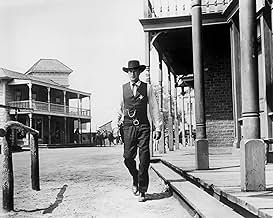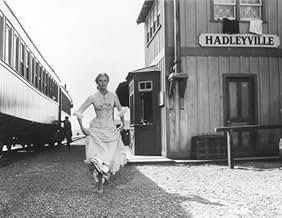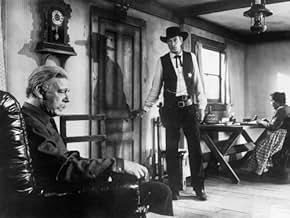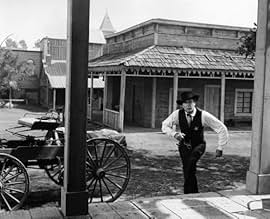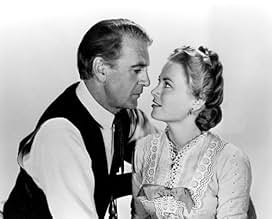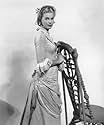A town Marshal, despite the disagreements of his newlywed bride and the townspeople around him, must face a gang of deadly killers alone at "high noon" when the gang leader, an outlaw he "se... Read allA town Marshal, despite the disagreements of his newlywed bride and the townspeople around him, must face a gang of deadly killers alone at "high noon" when the gang leader, an outlaw he "sent up" years ago, arrives on the noon train.A town Marshal, despite the disagreements of his newlywed bride and the townspeople around him, must face a gang of deadly killers alone at "high noon" when the gang leader, an outlaw he "sent up" years ago, arrives on the noon train.
- Director
- Writers
- Stars
- Won 4 Oscars
- 18 wins & 12 nominations total
- Martin Howe
- (as Lon Chaney)
- Sam Fuller
- (as Henry Morgan)
- Jim Pierce
- (as Robert Wilke)
- Townsman
- (uncredited)
- Church Member
- (uncredited)
- Director
- Writers
- All cast & crew
- Production, box office & more at IMDbPro
Featured reviews
"High Noon" is a low-budget western with a tense and suspenseful storyline. The tension is built in real time and Gary Cooper has an outstanding performance in the role of a Marshal moved by his duty to protect the town that does not deserve him. It is sad to see his former friends finding excuses to turn down his request for helping. The performances are top notch and the viewer gets tense while the clocks show the fatidic noon coming. Grace Kelly is astonishing beautiful and finds redemption in the conclusion when she saves Kane. The final scene when Kane drops his badge on the dirty floor is memorable. "High Noon" is certainly one of the most credible westerns of the cinema history and might be one of the best. My vote is ten.
Title (Brazil): 'Matar ou Morrer' ('To Kill or To Die')
Vengeance, treachery, ignorance, justice and survival - concentrated around the barrel of a gun.
Gary Cooper plays marshal Will Kaine, who turns in his star immediately after he marries Amy, a Quaker girl (Grace Kelly). Upsetting the celebration is the news that killer Frank Miller is due on the noon train and his first order of business is to kill Kaine, a man who Kaine helped send to prison five years ago and swore blood vengeance at the time. The three members of his gang are waiting at the depot. Miller escaped hanging, got a long sentence, and some knuckleheads on the parole board have turned him loose. At first Kaine is with the popular sentiment - Run!. But then he realizes that Miller will lay waste to the town if he isn't there - the new marshal isn't due in until the next day - plus Miller will hunt him down wherever he is - Kaine will always be looking over his shoulder.
He goes around looking for deputies to help him make his stand. Oh, everybody talks about what a good job Kaine did, but nobody stands up for him. They have all kinds of excuses. That a shootout will cause investors from the east and north to think their town is just another shoot em up town, that if Will isn't there Miller will just leave etc. In the end the result is NOBODY stood by him in his hour of need, in spite of the fact that many in the town owed their lives and fortunes to Kaine cleaning up the town.
The best device in this movie - added after a preview called the film dull - is the constant showing of the clock, ticking away the precious minutes Kaine has. And he is a human hero - because you can tell dying is on his mind, running is on his mind, but in the end he stays to face his enemies. The scene towards the end, with him standing in the middle of a dusty abandoned main street as the camera pulls back just to show how alone Kaine is in this battle is iconic.
Where is his wife you might ask? With a ticket in hand to get on the next train out. At least Grace Kelly's character has a reason for her pacifism - her newly found Quaker faith. What she fails to realize is that unless you are willing to be a slave you have to be strong enough that you can afford pacifism.
There are some great performances here. There is Lon Chaney as the old sheriff who Will goes to for help. The old sheriff has the best excuse of all - he is just too old for this. Will would be looking after him instead of himself. Then there is Lloyd Bridges as one of the most unlikeable characters in film history. He's Kane's ex-deputy Harvey Pell and he is a weasel without the cuteness factor. He is tired of living in Kaine's shadow, just a little jealous that Kaine had Harvey's girl before he had her, very resentful that Kaine would not recommend him to be the new marshal. But here is his chance - if Kaine runs, Kaine is no better than he is. That is why he beats Will up trying to put him on a horse towards the end of the film. He doesn't want Will to live, he wants him to run, to somehow prove he is a coward.
And you have to love the townspeople thinking that this will just "all go away" if everybody hides. The first act of the foursome of gunslingers when they hit town is not to kill Kaine, but to smash a store window and take a woman's bonnet that one of the killers fancies - an act of theft. They'll be stealing more than stuff by nightfall if nobody stops them.
Highly recommended.
On his wedding day, dependable lawman Will Kane (Gary Cooper) has just handed in his badge and is preparing to leave town with his bride Amy (Grace Kelly) when he receives devastating news. An old adversary, Frank Miller (Ian MacDonald), has been pardoned for crimes that he should have hanged for and is on his way to Kane's town of Hadleyville to get revenge. He is due on the noon train, leaving Kane one hour to either run for his life or make preparations to fight. Kane and Amy set off at full gallop, hoping to put some miles between themselves and danger, but Kane doesn't get far before he feels compelled to turn back. With the new sheriff not due for a day, he just can't let go of the extraordinary sense of duty and responsibility he feels towards his town. However when he gets back to town he gets quite a shock - for no-one has the guts (nor, in some instances, the inclination) to fight alongside him against the Miller gang. As time ticks unstoppably towards noon, Kane gradually realises that if he's going to stop Miller and his boys, he's going to have to do it alone!
Cooper's performance is extremely powerful and he received a thoroughly deserved Oscar for it. Kelly is good as his bride, although many viewers will find her character hard to like. Lloyd Bridges has a brilliant early role as Kane's deputy, while the very best of the supporting pack is Katy Jurado as a Latino woman whose "history" with most of the men in town puts her in an unenviable position when the shooting starts. Fred Zinnemann directs the film outstandingly, making each scene fit into the grander scheme of things with literate precision. Any aspiring young film-maker wanting to learn how to pace a film correctly should watch High Noon with a close eye, for it is unparallelled as the most perfectly paced film of all-time. The music by Dmitri Tomkin - plus that incredible ballad "Do Not Forsake Me Oh My Darling" by Tex Ritter - is just one more element that makes High Noon one of the great masterpieces. There's nothing else to say - if you haven't already, go out and see this film NOW!
Apparently, this film was intended as an allegory in Hollywood for the failure of Hollywood people to stand up to the House Un-American Activities Committee during the Sen. Joseph McCarthy Red-baiting era. John Wayne actually called the film "un-American", and was still trashing it twenty years later, which is pretty much the highest honor you can receive.
It must have also bothered Howard Hawks, because the "chicken" sheriff led Hawks to make "Rio Bravo", which, surprise, had John Wayne. As an interesting side note, Cooper was conservative, too, but I guess not as much as Wayne or at least not as emotional about it.
The film is called "a western for people who don't like westerns". I can see the point on that, but I do not know how accurate it is. I liked it, and I do not normally like westerns, so I probably should not argue. But I think some westerns are enjoyable by non-western fans, such as "Unforgiven". So "High Noon" is certainly not alone.
I love that the film is in "real time", that its running time is the same length as the actual plot. The only way this could have been better would be to do it with one, continuous shot. However, I suspect they did not have the technology for this, and it would ruin the cinematography. (Hitchkock basically did this with "Rope" with some key edits, but it is much easier when the film happens in a single room.)
Oh, and there is Lloyd Bridges, so young here...
Did you know
- TriviaIn 1951, after 25 years in show business, Gary Cooper's professional reputation was in decline, and he was dropped from the "Motion Picture Herald's" list of the top-ten box-office performers. In the following year, he made a big comeback, at the age of 51, with this film.
- GoofsIn a number of scenes there are Pabst Brewing signs seen on the inside and outside walls of the saloon. Although Pabst did brew in 1848, it did so under the name Best and Company and did not change to Pabst until 1889; the 37-star flag suggests the setting dates are between 1867-77.
- Quotes
Helen Ramírez: You're a good-looking boy: you've big, broad shoulders. But he's a man. And it takes more than big, broad shoulders to make a man.
- ConnectionsEdited into Darkness at High Noon: The Carl Foreman Documents (2002)
- SoundtracksHigh Noon (Do Not Forsake Me, Oh My Darlin')
Music by Dimitri Tiomkin
Lyrics by Ned Washington
Performed by Tex Ritter
[Played over the opening title card and credits; excerpts played throughout the movie]
Details
Box office
- Budget
- $730,000 (estimated)
- Gross worldwide
- $217
- Runtime1 hour 25 minutes
- Color
- Aspect ratio
- 1.37 : 1
Contribute to this page





